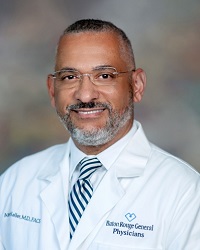Editor’s Note: The opinions expressed in this article are those of the author and do not necessarily reflect the opinions, positions, or the polices of the AAMC or its members.
A Cardiac Doctor With Heart Seeks More Physicians of Color

A day after the levees broke in New Orleans, Dr. V. Antoine Keller jumped aboard a helicopter to aid the masses trapped in the Superdome. He said he couldn't have imagined such desperation, disorder, and despair — even in his worst nightmares.
"We had very little medication, no food or water, and no air conditioning. It was 110 degrees, and the National Guard wasn't letting anybody out," said Keller, 40, a cardiovascular/thoracic surgeon who was among the first wave of doctors who flew into New Orleans after Hurricane Katrina hit.
Despite the destruction, however, Keller saw a resolve among survivors he said that has taught him a lesson for life.
"During the storm, I learned how strong people are. It gives me confidence in the strength of the human spirit."
Overcoming Fears
Several years earlier, Keller relied on his own strength to overcome his anxieties about medical school and graduate from Duke University Medical School.
"I had teachers who thought I couldn't take the rigors of a medical education," Keller said. "I had a freshman English professor in college who told me I could not write well and would never learn how to write well."
Keller concentrated on honing his writing skills and has gone on to author or co-author more than 40 publications, presentations, and abstracts.
Keller credits his family and mentors he found along the way with giving him the sense of confidence to persevere.
Closing the Diversity Gap
Today, Keller encourages other students of color to enter the field of medicine.
"Many students who are interested in medical school only need some encouragement," said Keller. "Getting more minorities into medicine has been a pet project of mine because the need is so great."
Practicing medicine at the Cardiovascular Institute of the South in Lafayette, Keller sees firsthand the impact of racial health disparities in the high rates of heart disease, diabetes, and the amputations that often result.
"New faces are needed in medicine to help fight these disparities," Keller said.
Keller believes that for many students of color, the process of polishing an application for admission committees may be more difficult than the academic requirements that will lie ahead.
"Getting your applications just right is a key part of the process minorities are not taught," Keller said. "Part of it has to do with access to information and legacy. Majority students applying to medical school have family and friends who are physicians, while fewer minorities have this kind of a legacy."
More Minorities in Medicine
If Keller gets his way, the legacy of having a doctor in the family tree will be a much more common occurrence for people of color in America. But he warns students that breaking down generations of self-imposed and outside barriers for a medical education won't be easy.
"I tell students they shouldn't expect everyone else to have the same enthusiasm for their success as they do," Keller said. "It's a tough message, but the world is a hard place. I tell them if they have mentors that care about their well-being, it makes it better."